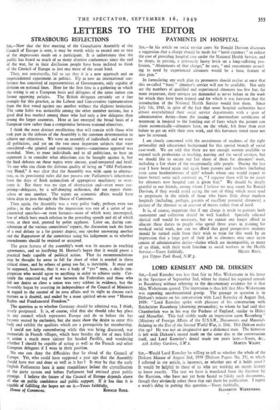PAYMENTS IN HOSPITAL
Ste,—In his article on social service costs Sir Ronald Davison discusses a suggestion that a charge should be made for " hotel expenses" to reduce the cost of providing hospital care under the National Health Service, and he drops, in passing, a grievously heavy brick on a long-suffering pro-, fession, "Abatements of that charge," he says, " and assessments accord- ing to need by experienced almoners would be a basic feature of this plan."
In formulating any such plan its promoters should realise at once that this so-called " basic " almoner's service will not be available. Not only arc the numbers of qualified and experienced almoners too few but, far more important, their services are demanded as never before in the work for which they have been trained and for which it was foreseen that the introduction of the National Health Service would free them. Since July 5th, 1948, in spite of the fact that some hospital authorities have almost overwhelmed their social service departments with a spate of administrative duties—from the issuing of intermediate certificates of treatment in hospital to the handing out of fares which the patient can claim automatically—almoners have, on the whole, felt freer than ever before to get on with their own work, and this fortunate trend must not now be reversed.
I am closely concerned with the recruitment of students of the right personality and educational background for this special branch of social case-work. We are told that there are not enough women available to expand such professions as teaching, nursing and the social services, but we should like to secure our fair share of them for almoners' work, including a fair share of the exceptionally able 'people. During the last year I have heard again and again from parents and teachers (including even some headmistresses of girls' schools whom one would expect to know better) some such comment as, " I suppose there will be no scope for almoners now hospital care is given free." We should be deeply grateful to our friends, among whom I believe we may count Sir Ronald Davison, if they would avoid saying the sort of thing which must tend to perpetuate in the minds of those who know little about modern hospitals (including, perhaps, parents of excellent potential almoners) a picture of the almoner as an assessor of means rather than of need.
It is, of course, important that if any charge is made to patients both assessment and collection should be well handled. Specially selected clerical staff would be necessary, but we cannot any longer afford to allocate these duties to people who spend three years in training for medical social work, nor can we afford that good prospective students should be turned aside from their wish to train for this work by an impression that a large part of their job as almoners may once again consist of administrative duties—duties which are incompatible, as many of us think, with their main function as social workers in the Health


































 Previous page
Previous page